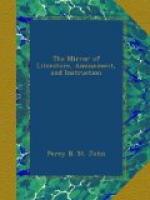* * * * *
ORIGINAL STORY OF HAMLET,
(From the Latin of Saxo Grammaticus, but interspersed.)
Florwendillus, king of Jutland, married Geruthra, or Gertrude, the only daughter of Ruric, king of Denmark. The produce of this union was a son, called Amlettus. When he grew towards manhood, his spirit and extraordinary abilities excited the envy and hatred of his uncle, who, before the birth of Amlettus, was regarded as presumptive heir to the crown. Fengo, which was the name of this haughty prince, conceived a passion for his sister-in-law, the queen; and meeting with reciprocal feelings, they soon arranged a plan, which putting into execution, he ascended the throne of his brother and espoused the widowed princess. Amlettus, (or Hamlet,) suspecting that his father had died by the hand or the devices of his uncle, determined to be revenged. But perceiving the jealousy with which the usurper eyed his superior talents, and the better to conceal his hatred and intentions, he affected a gradual derangement of reason, and at last acted all the extravagance of an absolute madman. Fengo’s guilt induced him to doubt the reality of a malady so favourable to his security; and suspicious of some direful project being hidden beneath assumed insanity, he tried by different stratagems to penetrate the truth. One of these was to draw him into a confidential interview with a young damsel, who had been the companion of his infancy; but Hamlet’s sagacity, and the timely caution of his intimate friend, frustrated this design. In these two persons we may recognise the Ophelia and Horatio of Shakspeare. A second plot was attended with equal want of success. It was concerted by Fengo that the queen should take her son to task in a private conversation, vainly flattering himself that the prince would not conceal his true state from the pleadings of a mother. Shakspeare has adopted every part of this scene, not only the precise situation and circumstances, but the sentiments and sometimes the very words themselves. The queen’s apartment was the appointed place of conference, where the king, to secure certain testimony, had previously ordered one of his courtiers to conceal himself under a heap of straw; so says the historian; and though Shakspeare, in unison with the refinement of more modern times, changes that rustic covering for the royal tapestry, yet it was even as Saxo Grammaticus relates it. In those primitive ages, straw, hay, of rushes, strewed on the floor, were the usual carpets in the chambers of the great. One of our Henrys, in making a progress to the north of England, previously sent forward a courier to order clean straw at every house where he was to take his lodging. But to return to the subject.




